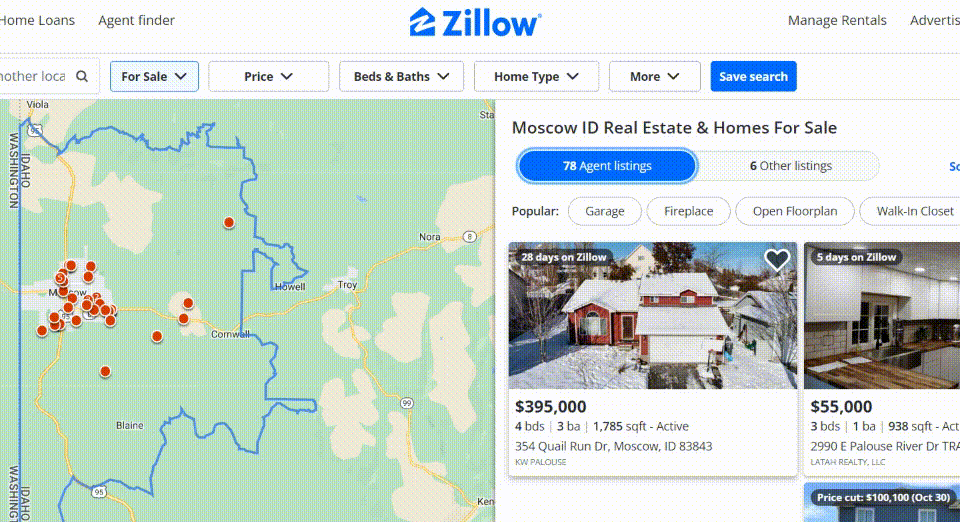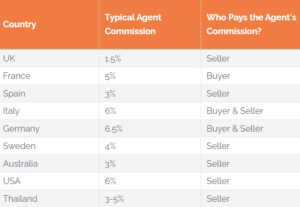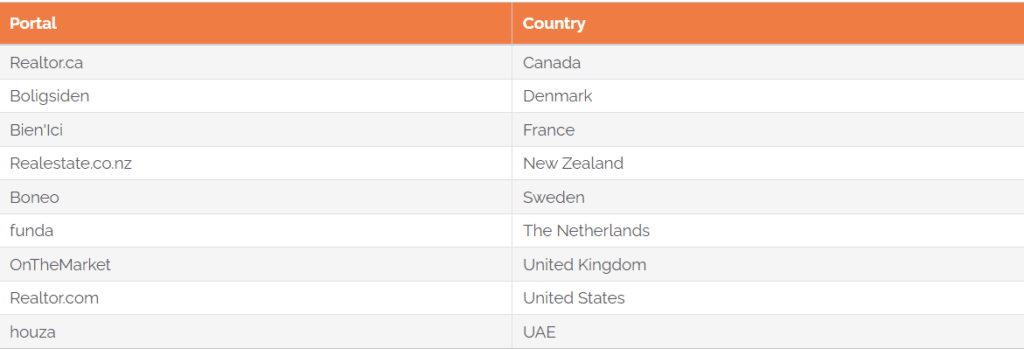
The material in this article is part of a presentation which will be shared with delegates of the Property Portal Watch conference held in Bangkok on the 1st and 2nd of March. To find out more and get your tickets visit the conference website.
In some markets around the world, their existence is highly controversial while in others they make up a huge percentage of sales. For sale by owner (FSBO) listings are rarely discussed by portal operating companies but many must quietly ponder the opportunity they represent for vendors to bypass agents.
We looked at hundreds of real estate portals around the world to find out where FSBO property listings are accepted on major real estate portals and where they aren't. The results are on the map below...
People reading this in a country like India, where FSBO listings are accepted on all the major portals, might wonder why on earth a real estate marketplace website would not allow private listings to be added by its users. Allowing private users to upload their own property for sale seems like a great way for the site to build unique content and brand loyalty.
Broadly speaking we can see that it is the more developed and mature real estate markets where FSBO listings are not allowed on real estate portals. This is usually because of the power of those portals' customers, the agents.
The more formal and mature the market, the more professional the agents in that market are and the more likely they are to band together in powerful organizations. As Frontier Digital Ventures' CEO for LATAM, Ricardo Frechou told us of his region:
"There are no brokers or agent licenses so everyone with a mobile phone basically can be an agent... the local Realtors associations aren't so strong so that also is key as they lack the power to negotiate with portals."
However, there comes a point for many real estate portals where the free unique content from FSBO listings and any money they can charge a vendor to list them becomes less valuable than the goodwill of their agent customers for whom vendors who choose to sell their homes privately represent a form of competition.
While the fear of agents' reactions might be one simplistic reason for some portals not to accept FSBO listings, there is plenty of nuance to the issue and there are some interesting case studies around the world when it comes to vendors using portals to sell their own homes...
Leading U.S. real estate portal Zillow does allow users to upload FSBO listings but does not list them alongside the majority of its realtor-originated listings. Zillow's move to classify certain discount brokerages who don't subscribe to the MLS alongside FSBO listings has sparked a big lawsuit and could see the fate of FSBO listings on American portals changed forever.

Above: Zillow's 'Other listings' tab doesn't see nearly as much action as its 'Agent listings' tab (source: Zillow.com).
As with any protracted legal case that generates headlines every few months, there is quite a big timeline to read for the full picture of the lawsuit brought against Zillow by discount brokerage REX in 2021.
Essentially, REX's complaint is that as a discount brokerage, its listings were relegated to the 'other listings' tab on Zillow's results pages - a tab which Zillow has to have separate from its regular listings thanks to its membership of the National Association of Realtors.
Online Marketplaces' latest coverage of the case sums up the case and the ramifications it could have on the presence of FSBO listings on U.S. real estate portals.
"The entangled legal spat between the parties involved in this case is not only important because of the impact on bank balances for the loser. If REX is to prevail then Zillow and other U.S. real estate marketplace sites may be forced to change how they display listings from sources such as discount brokerages and FSBO which do not pay MLS membership fees.
This could lead to increased viability for discount business models such as that of REX and more Americans choosing to forgo the services of an agent and list their home for sale themselves."
In France, while specialist real estate vertical sites SeLoger and A Vendre A Louer do not allow FSBO listings, leading Adevinta-owned horizontal marketplace Leboncoin does allow them.
Another real estate portal that most definitely does allow private users to post their listings is PAP.fr. The specialist FSBO portal has cornered a not-insignificant market share in France having existed in one form or another since being founded "in a fit of anger" against agency fees in 1975 by Catherine and Patrick Jolly.
Nowadays, PAP.fr (De Particulier à Particulier) is run by the couple's daughter Corinne who is as passionate as her parents about a seller's right to go it alone.
The portal has attracted plenty of controversy over the years. In a 2020 case that was the talk of the French real estate industry, a court dismissed the allegations of denigration brought by an incensed agents association FNAIM (which is a major stakeholder in the Bien'Ici portal).
The case was sparked by a 2019 interview with Jolly in which she outlined PAP's FSBO product which at the time was named "better than an agency".
Not wishing to incite another legal furore, Jolly declined to speak with us for this article.
Another market where FSBO listings periodically cause controversy is the UK where no major real estate portal accepts FSBO listings... at least not openly.
 With vendors in the UK lucky enough to only pay between 1-2% commission on the sale of their property there isn't as much of a market for FSBO options compared to the likes of France and Italy where around 40-45% of transactions occur without a licensed agent.
With vendors in the UK lucky enough to only pay between 1-2% commission on the sale of their property there isn't as much of a market for FSBO options compared to the likes of France and Italy where around 40-45% of transactions occur without a licensed agent.
That doesn't mean that some companies won't try to blur the lines between FSBO and agency to serve those vendors who still don't see the merit of using an agent.
The major portals do not allow direct FSBO listings and their terms and conditions state that they don't accept listings from online, ultra-low commission agencies that do minimal work to sell the vendor's home either.
But according to industry veteran and founder of the property social network PropertyHeads, Ben Davis, some of these companies slip through the nets and are allowed to list on the major portals now and again.
"New players come along a couple of times per year, but it's always been a grey area. Openrent, Doorsteps, 99home, even Purplebricks have all been seen in this way to a greater or lesser extent. The issue is compounded by Rightmove's charging model."
It's not just agent pressure that keeps FSBO listings off the main portals. In a few markets, it is the way the property market is set up and the way that the portals get paid that aligns portal and agent interests to keep private vendors from listing on their own.
Unlike in a market like the UK where portals make money from agents by charging a monthly subscription fee to each of their agent customers without the vendor being involved, in markets such as Australia and Sweden, the vendor is the one ultimately responsible for paying the portal to market their home.
Real estate portals like Hemnet in Sweden do not allow private sellers to list directly on the portal. Why would they? The amount that Hemnet earns is directly related to the number of listings on its site rather than the number of agencies.
And what better sales team to convince a vendor to bump up marketing spend than a professional agent who won't have to pay more to increase exposure on the portal but will reap the rewards of a quicker sale?

In Australia, the lack of FSBO opportunities and a desire to sell property off-market is becoming increasingly popular. One platform taking advantage is off-market specialist Listing Loop whose co-founder and CEO Rhett Dallwitz (pictured) told us that while the private listings market in Australia is small compared to agent-facilitated transactions, "private listings are an opportunity to capture property listings exclusive to us that are not found on competitor websites."
Listing Loop does offer agent-led sales alongside its private listings options and says that "at any time a private seller can upgrade to an agent-led sales campaign via our preferred agent network should they find that the private sale process is not for them."
Dallwitz believes that if Australian portal giant REA Group were to start allowing FSBO listings, the company "would jeopardise their revenue from real estate agents."
The major Chinese real estate portals do allow FSBO listings on their sites but, according to Chinese real estate market expert Brett Hartley Wilson, there is no mainstream FSBO platform and no real culture of it in China.
"It [FSBO listing] does happen in rural/regional areas where there is an absence of real estate agents. There are also Gumtree-like sites in bigger cities, but nothing at scale."

Brett Hartley Wilson will be among the presenters at this year's Property Portal Watch event in Bangkok in March
There is one city in China, however where FSBO listings have been actively encouraged by the local government...
Hangzhou is a city in Eastern China which attracts a lot of tech talent thanks to its status as the home of e-commerce giant Alibaba. As its population has swollen beyond 10 million Hangzhou has also become known for its housing crisis.
In 2016 the city's government, tired of agents juicing up property prices and echoing President Xi Jinping’s famous words that “housing is for living in and not for speculation”, introduced its own buying and selling service for second-hand housing.
After being authenticated a seller could upload the details of their property for sale to the platform and follow the steps to transact the property fully online without an agent.
The platform, ultimately, didn't work as a true marketplace and went nowhere fast. In order to keep out snooping brokers, users interested in buying had to be authenticated just to see listings.
Another reason for not allowing users to post their own listings for sale is that it is simply not worth it.
In Africa, there was one portal whose lack of FSBO listings surprised us. Property24 is the Naspers-owned market leader in South Africa which also has a presence in several other sub-Saharan African markets. The company's South African portal does allow FSBO listings but in all other markets, its portals do not have an FSBO upload feature.
Property24 told us that FSBO listings represent less than 1% of total listings on its South African portal. The company said it may decide to build the feature for its portals outside of South Africa but for now, the online presence is too small and the feature would capture too few listings to justify the work.
In many markets, including some markets where FSBO listings are mostly accepted on other portals, there are some major real estate sites that do not allow FSBO listings because of who they are owned by.
Obviously real estate portals that count agent groups as significant stakeholders, such as those in the table below, don't allow FSBO listings on their platforms.

Others such as PropertyGuru in Southeast Asia and Kilid in Iran aren't owned by agent groups but see the good favour with their customers as more valuable than any FSBO listings opportunities.
Interestingly though, although PropertyGuru foreswears FSBO listings in some markets and on some of its portals, the newly listed company does not have a blanket policy across its assets in different markets. The company's leading Vietnamese portal Batdongsan allows private users to upload listings but all of its other portal sites do not.